
Please Please Me is the debut studio album by the English rock band the Beatles. Produced by George Martin, it was released on EMI's Parlophone label on 22 March 1963 in the United Kingdom, following the success of the band's first two singles "Love Me Do", which reached number 17 on the Record Retailer Chart, and "Please Please Me", which reached number one on the NME and Melody Maker charts. The album topped Record Retailer's LP chart for 30 weeks, an unprecedented achievement for a pop album at that time.
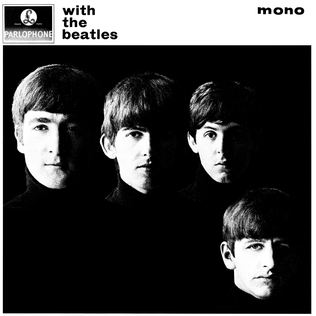
With the Beatles is the second studio album by the English rock band the Beatles. It was released in the United Kingdom on 22 November 1963 on Parlophone, eight months after the band's debut Please Please Me. Produced by George Martin, the album features eight original compositions and six covers. The sessions also yielded the non-album single, "I Want to Hold Your Hand" backed by "This Boy". The cover photograph was taken by the fashion photographer Robert Freeman and has since been mimicked by several music groups over the years. A different cover was used for the Australian release of the album, which the Beatles were displeased with.
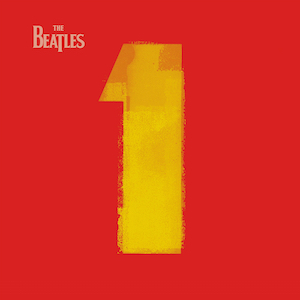
1 is a compilation album by the English rock band the Beatles, originally released on 13 November 2000. The album features virtually every number-one single the band achieved in the United Kingdom or United States from 1962 to 1970. Issued on the 30th anniversary of the band's break-up, it was their first compilation available on only one CD. 1 was a commercial success and topped charts worldwide. It has sold over 31 million copies.

Worldwide, the English rock band the Beatles released 12 studio albums, 6 live albums, 54 compilation albums, 36 extended plays (EPs), 63 singles, 17 box sets, 22 video albums and 68 music videos. In their native United Kingdom, they released 12 studio albums, 13 extended plays (EPs), including one double EP, and 22 singles. The early albums and singles released from 1962 to 1967 were originally on Parlophone, and their albums and singles from 1968 to 1970 were on their subsidiary label Apple. Their output also includes vault items, remixed mash-ups and anniversary box-sets.
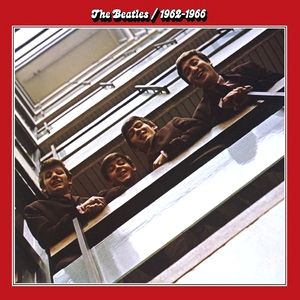
1962–1966, also known as the Red Album, is a compilation album of hit songs by the English rock band the Beatles, spanning the years indicated in the title. Released with its counterpart 1967–1970 in 1973, the double LP peaked at number 3 in the United Kingdom. In the United States, it topped the Cash Box albums chart and peaked at number 3 on the Billboard Top LPs & Tape chart while 1967–1970 reached the top spot. The album was re-released in September 1993 on compact disc, charting at number 3 in the UK.
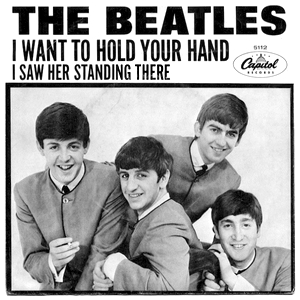
"I Want to Hold Your Hand" is a song by the English rock band the Beatles. Written by John Lennon and Paul McCartney, and recorded on 17 October 1963, it was the first Beatles record to be made using four-track equipment.

"Twist and Shout" is a 1961 song written by Phil Medley and Bert Berns. It was originally recorded by the Top Notes, but it did not become a hit in the record charts until it was reworked by the Isley Brothers in 1962. The song has been covered by several artists, including the Beatles, Salt-N-Pepa, and Chaka Demus & Pliers, who experienced chart success with their versions.

Anthology 1 is a compilation album by the Beatles, released on 20 November 1995 by Apple Records as part of The Beatles Anthology series. It features rarities, outtakes and live performances from the period 1958–64, including songs with original bass player Stuart Sutcliffe and drummer Pete Best. It is the first in a trilogy of albums with Anthology 2 and Anthology 3, all of which tie in with the televised special The Beatles Anthology. It contains "Free as a Bird", billed as the first new Beatles song in 25 years, which was released as a single two weeks after Anthology 1.

20 Greatest Hits is a compilation album featuring a selection of songs by The Beatles that were number one singles in the UK and US. It was released on 11 October 1982 in the United States and 18 October in the United Kingdom and marked the 20th anniversary of The Beatles' first record release, "Love Me Do", in the UK in October 1962. 20 Greatest Hits was the last Beatles album to be released with variations between the U.S. and UK versions. There is an extremely rare 8 track tape version of this album, which approximately 10 to 15 copies still exist today. Legend has it that Capitol Records decided to pull the plug on the release at the last minute, as 8 tracks were not selling well in late 1982, and all copies were to be destroyed. However, there were a few that survived.
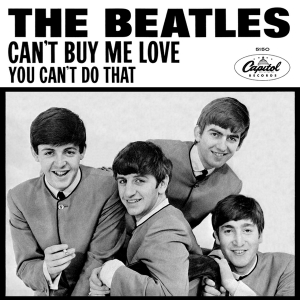
"Can't Buy Me Love" is a song by the English rock band the Beatles that was released in March 1964 as the A-side of their sixth single. It was written by Paul McCartney and credited to the Lennon–McCartney partnership. The song was included on the group's album A Hard Day's Night and was featured in a scene in Richard Lester's film of the same title. The single topped charts in the United Kingdom, the United States, Australia, Ireland, New Zealand and Sweden. In the UK, it was the fourth highest selling single of the 1960s.

"Please Please Me" is a song released by the English rock band the Beatles. It was their second single in the United Kingdom, and their first in the United States. It is also the title track of their first LP, which was recorded to capitalise on the success of the single. It is a John Lennon composition, although its ultimate form was significantly influenced by producer George Martin.
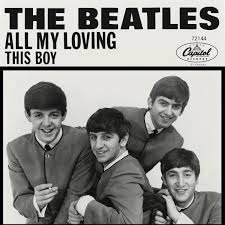
"All My Loving" is a song by the English rock band the Beatles, from their second UK album With the Beatles (1963). It was written by Paul McCartney, and produced by George Martin. Though not officially released as a single in the United Kingdom or the United States, the song drew considerable radio airplay, prompting EMI to issue it as the title track of an EP. The song was released as a single in Canada, where it became a number one hit. The Canadian single was imported into the US in enough quantities to peak at number 45 on the US Billboard Hot 100 in April 1964.

"Roll Over Beethoven" is a 1956 hit song written by Chuck Berry, originally released on Chess Records single, with "Drifting Heart" as the B-side. The lyrics of the song mention rock and roll and the desire for rhythm and blues to replace classical music. The title of the song is an imperative directed at the composer Ludwig van Beethoven to roll over out of the way and make room for the rock and roll music that Berry was promoting. The song has been covered by many other artists, including the Beatles and the Electric Light Orchestra. Rolling Stone magazine ranked it number 97 on its list of the "500 Greatest Songs of All Time".
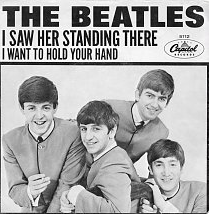
"I Saw Her Standing There" is a song by the English rock band the Beatles credited to Paul McCartney and John Lennon, but written primarily by McCartney. It is the opening track on the band's 1963 debut UK album Please Please Me and their debut US album Introducing... The Beatles.
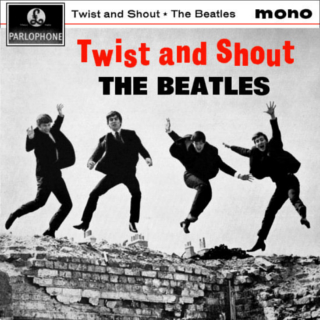
Twist and Shout is the first UK extended play by the English rock band the Beatles, released by Parlophone on 12 July 1963. It was also released in Germany, Spain, New Zealand, Australia and Argentina. It topped the UK EP chart for twenty-one weeks, becoming so successful that it registered on the singles chart and eventually ranked as the fourth-bestselling "single" of 1963 in Britain. All four tracks on the EP were originally released on the band's debut album that year, Please Please Me.

The Beatles' Hits EP was released 6 September 1963. It is the Beatles second British EP and was only released in mono, with the catalogue number Parlophone GEP 8880. It was also released in Australia and New Zealand.

"You're My World" is a ballad originally recorded in 1963 as "Il mio mondo" by Umberto Bindi, who co-wrote the Italian version with Gino Paoli. Subsequently, an English version was commissioned, and the lyrics were written by Carl Sigman as "You're My World". The song reached No. 1 in Australia (twice), Belgium, Mexico, Netherlands, South Africa and United Kingdom in recordings by Cilla Black, Daryl Braithwaite, Guys 'n' Dolls and Helen Reddy. Black's and Reddy's versions reached the US Top 40 in 1964 and 1977, respectively. The song also reached No. 1 in France and Spain in the respective translations "Ce monde" and "Mi Mundo", both sung by Richard Anthony.

The Beatles is an EP released by the Beatles in the United Kingdom on 1 November 1963. It is the Beatles' third British EP and was only released in mono; its catalogue number is Parlophone GEP 8883. The EP contains songs from Please Please Me, and its cover was taken in the same photoshoot as the Please Please Me and 1962–1966 covers. It was also released in Argentina and New Zealand.

The Chipmunks Sing the Beatles Hits is a tribute album of Alvin and the Chipmunks singing the hits of the Beatles. It was originally released in 1964 by Liberty Records on vinyl record, and consists of Chipmunk renditions of early Beatles hits.

Extracts from the Album A Hard Day's Night is the Beatles seventh official EP, released on 6 November 1964. This EP contains four tracks from the album that were not featured in the film. Its catalogue number is Parlophone GEP 8924. It was also released in France.




















